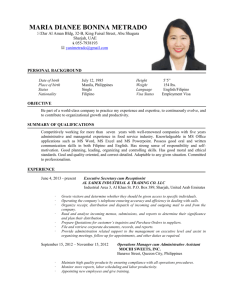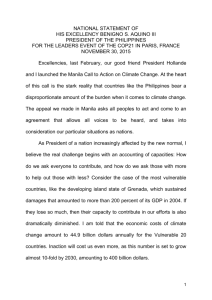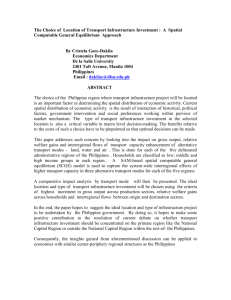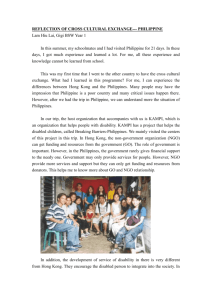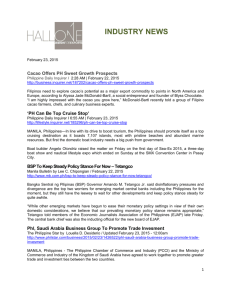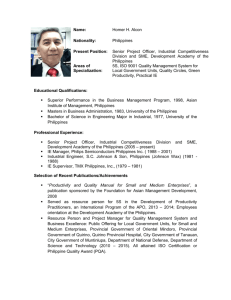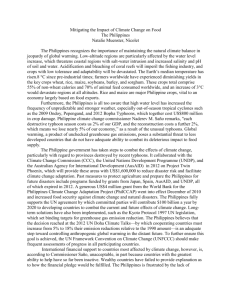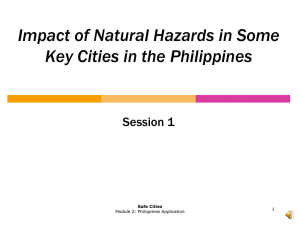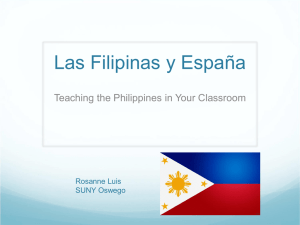(CIF) Program in the Philippines
advertisement
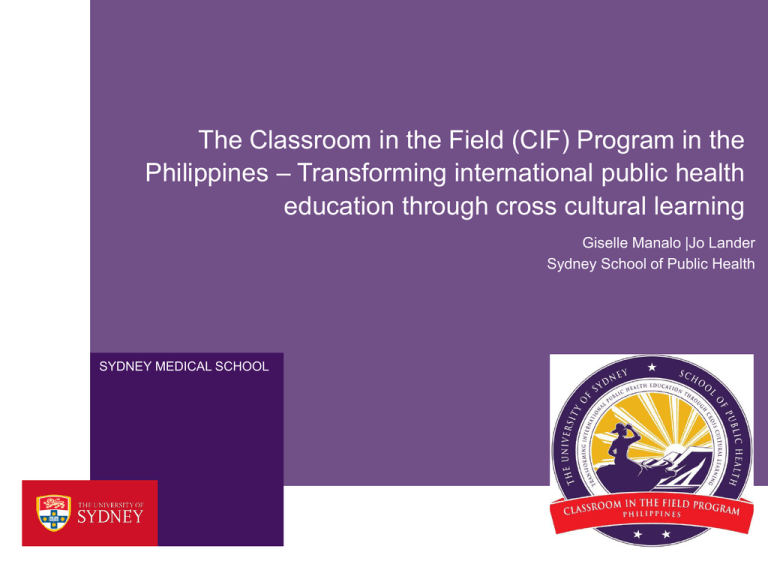
The Classroom in the Field (CIF) Program in the Philippines – Transforming international public health education through cross cultural learning Giselle Manalo |Jo Lander Sydney School of Public Health SYDNEY MEDICAL SCHOOL What? › Offers selected students 8 week field placements with partner organisations in the Philippines › Aim: To provide students with a contextual understanding of “on the ground” approaches to international health issues… provide insight into community-based educational programmes and community mobilization, the complexities of the Philippine health system and the implementation of health programmes at the national, regional, municipal, city and village levels. 2 Why? › Socially accountable › Culturally sensitive › Transformative (and perhaps life-changing) › Community engaged › Authentic, work-embedded › Health systems - based › Partnerships › Transcends the confines of the classroom (Frenk et al, 2010: Health professionals for new century: transforming education to strengthen health systems in an interdependent world. Lancet 376: December 4 pp 1923 – 1958) Who? › Genuine collaboration between SPH/ SMS and distinguished Philippine partners: - Health Human Resource Development Bureau of the Department of Health, - University of the Philippines Manila, - Zuellig Family Foundation - United Nations Population Fund Philippines. › Planning 2010 – 2012 › Partnerships formalised with letters of intent – late 2012 › 2013 – first cohort: 5 students, 3 of these self-funded 4 Learning › Embedded in 5 MIPH units of study – communicable disease; maternal and child health; culture, health, illness and medicine; health systems in developing countries or independent study – › Unit chosen influences placement and topic › Assessment: report and presentation › Topics: context of host organisation/ relevant to host organisation/ host develops learning activities and may provide training e.g. leadership / useful recommendations expected › Independent but well supported 5 Pre-departure › Program described in dedicated LMS site, information session(s) held › Selection on academic merit and interview (esp cultural competence – scenarios suggested by partners) + matching to organisations › Pre-departure orientation session and information pack – local Filipino mentors Pre-departure briefing 6 On arrival in the Philippines › Philippines-based mentors – mostly alumni › Orientation sessions with local supervisors › Tailored program of learning activities with host organisations – National Health Agenda › Final presentations / closing program - Manila Giselle with in-country mentors 7 Briefings from partners 8 Even from some not directly involved in the program ... 9 Closing ceremony › "You (MIPH students) are inspiring. You do not know your impact and may not see your impact until later, but you have made an impact." Dr Ruth Politico, Health Human Resources Development Bureau, Department of Health, Philippines › “It was without doubt one of the most impressive things I have experienced in my career in public health.” Professor Glenn Salkeld, Head of School Closing ceremony 10 Back in Sydney... 11 A few days later in the small town of Argao Cebu ... 12 The future ... › “While watching and listening to your presentations, we (at ZFF) are already thinking of new approaches on how to improve your learning experience with us. Just as you have learnt from us (and other partners), we, too, have learned a lot from you!” Dr Bien Nillos, supervisor,Zuellig Family Foundation › 2015 Australian Government International Student Mobility Program Funding – 10 places – Timor Leste, Philippines, Vietnam (Office of Global Health) › 2014-5 recruitment started › Students from Grad Dip Indigenous Health Promotion › Expand program further › More comprehensive evaluation and publication 13 Crowd sourcing ... 14 Questions? 15
